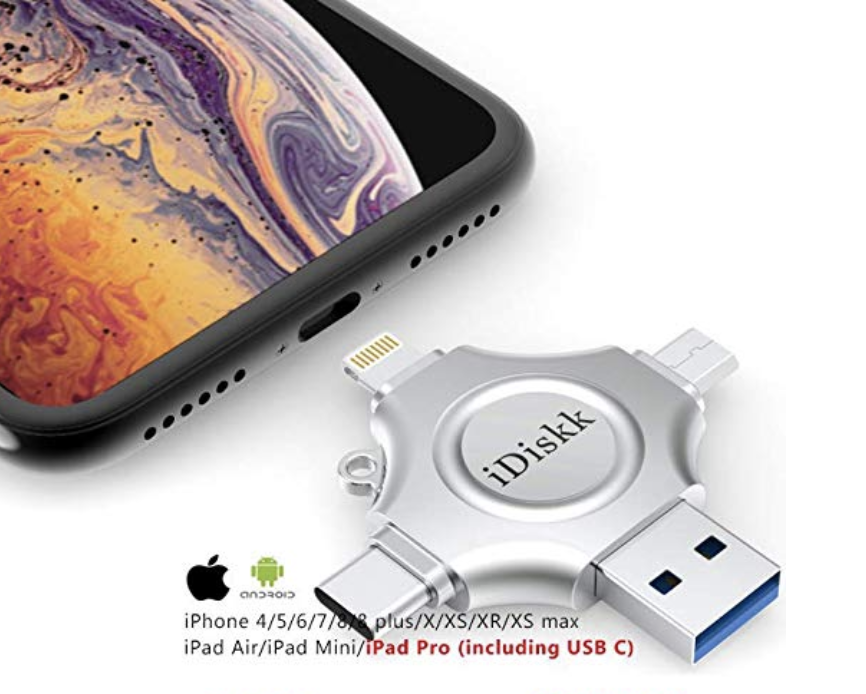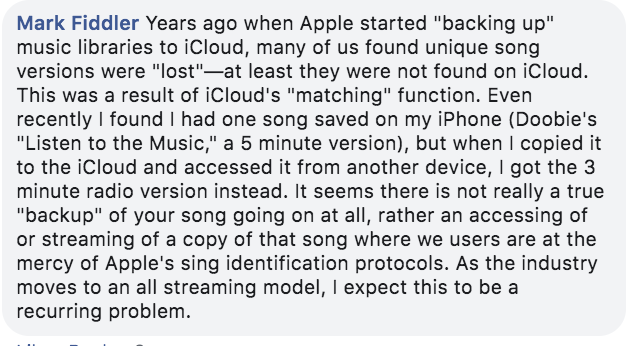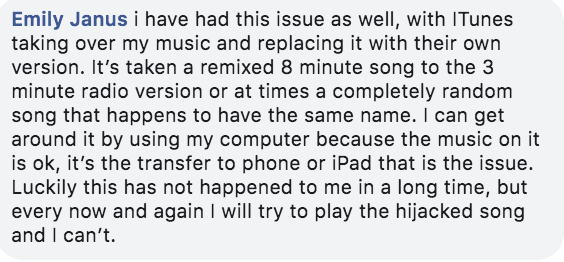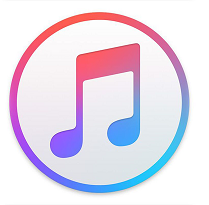The announcement showed up in my Twitter feed: Apple doing away with iTunes.
My first reaction was a sinking feeling, even a mild panic—although I do know I wouldn’t lose the songs I’ve purchased. I’ve been using iTunes for my classes since 2006 and have over 11,000 songs and close to 1,000 playlists. I have been developing hundreds of playlists for the Indoor Cycling Association on Spotify and occasionally use it to teach, but I still use iTunes for about 90% of my classes.
I posted the link to the Apple announcement in a few of the Facebook indoor cycling groups and the response was immediate. INSTANT PANIC! Some instructors even thought they would lose all of their music and all of their playlists.
I started doing some research and asking more tech-oriented people. Furthermore, since that first revelation, Apple has clarified what will be happening and when. So I thought I’d gather what I’ve learned into one article to help allay the fears of long-time iTunes users.
First let me reassure you—you are not going to lose your purchased songs, although I have some tips for backing them up that I’ll give you in a moment.
Based on the reactions in the online forums, I believe some clarification about music files and the difference between streaming services and iTunes are in order.
Your Purchased Music Files Are Yours
When you purchase a song, whether it is from iTunes, Amazon, Beatport, SoundCloud, or any other music source, that audio file is yours. If you took a CD and uploaded it to your computer (called “ripping” a CD), those digital music files are yours. Heck, even if you acquired that audio file by stripping it off a YouTube video—a method I do not condone—that file is now on your computer as an MP3 and is yours.
It does not matter how you acquired that audio file—your computer will not know the difference—it now resides on your computer and is yours.
There are different types of audio files available. Some have higher-quality sound than others. MP3s are one of the most common audio files available. Audio files downloaded from the Apple store are AAC files. The type of files is not that important to this discussion; if you want to know more, you can read about AAC files here and MP3 files here. Think of your audio files—whatever form they come in—as similar to physical “books” in your library. You can buy that book at any bookstore or order it online. Your bookshelf doesn’t know or care where it came from. And when you move, you can take those books with you.
Your digital audio files—AACs, MP3s, and such—are similar to my book example in that they are stored on your “bookshelf,” or your library on your hard drive. These audio files are different from streaming files you can listen to from sources such as Spotify, Amazon Prime, Apple Music, or other services. Think of streaming music more like library books that you have to return—you are in essence “borrowing” them. You do not own those files and cannot take them with you. You cannot alter these files in any way (shorten them, overlap them into one continuous file, create loops, change the tempo, etc.) like you can your own audio files using software like MixMeister, GarageBand, and others. Once you stop paying for the service, while you can still listen to the songs for free with annoying ads, you can’t really use them for your classes.
The New Apple Music App
iTunes was Apple’s original platform for organizing and displaying your music files. It linked to the Apple music store, where you could buy individual songs, and allowed you to load songs that you purchased elsewhere, as outlined above. Over time, the software expanded to include podcasts, videos, and Apple TV, turning it into a behemoth and making it unwieldy and more complicated to update.
The recent announcement that Apple is getting rid of iTunes was probably leaked a little too early—normally Apple has a polished way of releasing information about updated or new programs. As a result, many communities panicked, including the fitness world. The misunderstanding and fear in the indoor cycling community was massive.
The truth is that it’s not disappearing—it’s being replaced by something much better. It will happen this coming fall with the release of the new operating system, Catalina, which will include standalone versions of Apple Music, Apple Podcasts, and the Apple TV App. From the Apple press release on the new operating system:
macOS Catalina replaces iTunes with three all-new apps that greatly simplify and improve the way Mac users discover and enjoy their favorite music, TV shows, movies and podcasts.
The new Music app for Mac is lightning fast, fun and easy to use. Apple Music will help users discover great new music with over 50 million songs, playlists and music videos. And users will have access to their entire music library, whether they downloaded the songs, purchased them or ripped them from a CD. For those who like to own their music, the iTunes Music Store is just a click away.
So the good news is that there is no reason to panic! The new app will do everything the old one did, and from the looks of it, will be even easier to use. You will still have access to your purchased music, you will still be able to purchase more songs from any source (whether it’s Apple, Amazon, or another source), and your playlists should transfer over seamlessly to the new app.
THAT BEING SAID…
I don’t always trust tech companies and never doubt that they may make something obsolete. (You should see my large drawerful of useless antiquated power cords, adaptors, and such from whenever I am forced to purchase a new phone or computer.) Just to be sure you always have access to your own audio files, I recommend that you regularly back up your computer to an external hard drive. Make sure to do it frequently so you don’t lose recent purchases. This article explains how to do so.
If you only use your phone, you can back it up to a flash drive. But knowing me and my tendency to lose things, I’d be in trouble; these small drives are infinitely more “losable” than an external hard drive that never leaves my desk.

Also, make sure to read this article on how to make sure your iTunes library is organized and consolidated to get ready for the launch of Catalina this coming fall.
What About iCloud Storage?
Someone recently told me she only ever uses her phone to purchase and store her music. I don’t have experience with that but if it were me, I’d feel better knowing my music files were in more than one place. Even if you back up your phone to a flash drive, you should also store your music in a cloud-based system. Here is an article that explains how Apple’s iCloud backup works.
However, cloud-based storage is not without issues and it would worry me if I relied on it as my sole backup. I heard from numerous instructors who no longer had access to some of their songs, especially unique versions that aren’t available through streaming services. I recently asked in one of the Facebook groups for stories on losing music. Here are a couple of them:


So iCloud user, beware…looks like it’s a good idea to back up your phone to an external drive as well, especially if you have unique versions of songs—no matter how much that Apple Genius person tells you it’s safe to use iCloud!
Apple Music or Spotify for Streaming Music?
Apple Music and Spotify are competitors in the streaming music category. The new Apple Music app will no doubt make the Apple Music streaming service more attractive, especially if it solves some of the user issues encountered in Spotify. They are the same price ($9.99/month) and both of them have access to mostly the same music, although there are some songs available on Apple Music that aren’t on Spotify and vice versa. I am assuming that most people will not pay for both, so you’ll have to make a choice if you want to discontinue purchasing individual songs.
Even as a longtime Apple iTunes user, I opted to use Spotify for ICA playlists because the vast majority of users in the indoor cycling groups and among our members seemed to be using it more than Apple Music. About three years ago, we began building playlists in Spotify for our theme rides, as well as categories such as bpm ranges, terrain, FTP testing, Tour de France, ethnic music, warm-ups and cool-downs, and other ways to divide music that we suggest on ICA. We currently have over 600 playlists that we have been doling out to ICA members (in our profiles as well as theme ride suggestions); many have several hundred songs and a few are close to or over 1,000 songs. It’s an extremely time-consuming process to create these playlists and we continually add to them, but in doing so, we save our members many, many hours when looking for music. For that reason, we won’t be switching to Apple Music.
If you are an ICA member and use Apple Music or plan to start using it when the new Music app launches, my suggestion is to sign up for a free Spotify account. Then you can still see ICA Spotify playlists and, if desired, re-create them in your Apple Music account. It will still be time-consuming, but much less so than creating all your playlists on your own.
I want to make one final note here about using a streaming service such as Apple Music or Spotify. Streaming music services cost less than buying new music, but even if you make the choice to stop purchasing new songs, always remember that you will still have access to your existing library of unique songs (backed up on an external drive just in case as outlined above, right?) that you’ve already purchased. You will be able to combine your local songs into playlists on Spotify or Apple Music. Just know that if you share a playlist that includes any of your unique songs stored on your local drive with someone else, they will not have access to the songs in your local library. They will have to replace it with a similar song found in the streaming service’s library. From what I’ve encountered in my Spotify playlists created from some of my older profile playlists in iTunes, that is not always easy to do. I often have to select a different song entirely.
If you have any questions about music files that you want me to research, or if you have had issues with accessing your music files in the cloud, leave your comments below.

